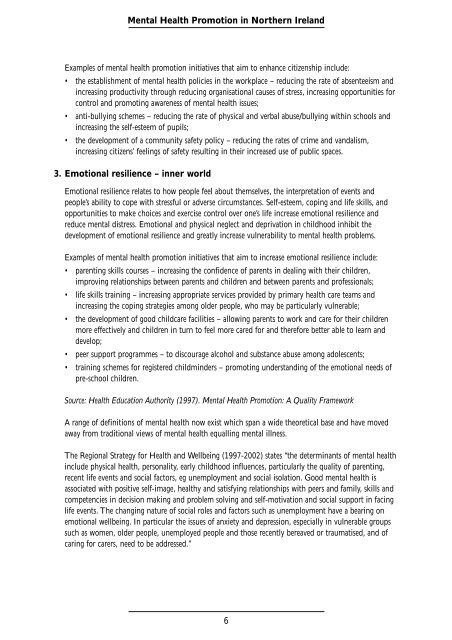MENTAL HEALTH PROMOTION - Health Promotion Agency
MENTAL HEALTH PROMOTION - Health Promotion Agency
MENTAL HEALTH PROMOTION - Health Promotion Agency
You also want an ePaper? Increase the reach of your titles
YUMPU automatically turns print PDFs into web optimized ePapers that Google loves.
Mental <strong>Health</strong> <strong>Promotion</strong> in Northern Ireland<br />
Examples of mental health promotion initiatives that aim to enhance citizenship include:<br />
• the establishment of mental health policies in the workplace – reducing the rate of absenteeism and<br />
increasing productivity through reducing organisational causes of stress, increasing opportunities for<br />
control and promoting awareness of mental health issues;<br />
• anti-bullying schemes – reducing the rate of physical and verbal abuse/bullying within schools and<br />
increasing the self-esteem of pupils;<br />
• the development of a community safety policy – reducing the rates of crime and vandalism,<br />
increasing citizens’ feelings of safety resulting in their increased use of public spaces.<br />
3. Emotional resilience – inner world<br />
Emotional resilience relates to how people feel about themselves, the interpretation of events and<br />
people’s ability to cope with stressful or adverse circumstances. Self-esteem, coping and life skills, and<br />
opportunities to make choices and exercise control over one’s life increase emotional resilience and<br />
reduce mental distress. Emotional and physical neglect and deprivation in childhood inhibit the<br />
development of emotional resilience and greatly increase vulnerability to mental health problems.<br />
Examples of mental health promotion initiatives that aim to increase emotional resilience include:<br />
• parenting skills courses – increasing the confidence of parents in dealing with their children,<br />
improving relationships between parents and children and between parents and professionals;<br />
• life skills training – increasing appropriate services provided by primary health care teams and<br />
increasing the coping strategies among older people, who may be particularly vulnerable;<br />
• the development of good childcare facilities – allowing parents to work and care for their children<br />
more effectively and children in turn to feel more cared for and therefore better able to learn and<br />
develop;<br />
• peer support programmes – to discourage alcohol and substance abuse among adolescents;<br />
• training schemes for registered childminders – promoting understanding of the emotional needs of<br />
pre-school children.<br />
Source: <strong>Health</strong> Education Authority (1997). Mental <strong>Health</strong> <strong>Promotion</strong>: A Quality Framework<br />
A range of definitions of mental health now exist which span a wide theoretical base and have moved<br />
away from traditional views of mental health equalling mental illness.<br />
The Regional Strategy for <strong>Health</strong> and Wellbeing (1997-2002) states “the determinants of mental health<br />
include physical health, personality, early childhood influences, particularly the quality of parenting,<br />
recent life events and social factors, eg unemployment and social isolation. Good mental health is<br />
associated with positive self-image, healthy and satisfying relationships with peers and family, skills and<br />
competencies in decision making and problem solving and self-motivation and social support in facing<br />
life events. The changing nature of social roles and factors such as unemployment have a bearing on<br />
emotional wellbeing. In particular the issues of anxiety and depression, especially in vulnerable groups<br />
such as women, older people, unemployed people and those recently bereaved or traumatised, and of<br />
caring for carers, need to be addressed.”<br />
6
















